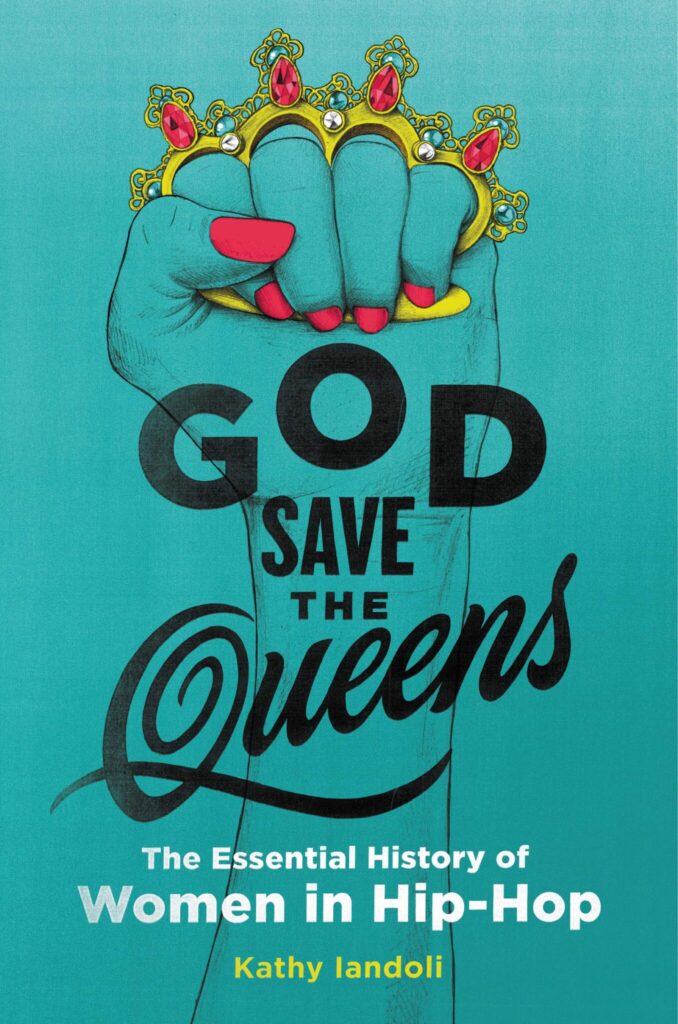
IANDOLI, KATHY. GOD SAVE THE QUEENS: The Essential History of Women in Hip-
Hop. HARPERCOLLINS, 2020.
It was 2009 and Kathy Iandoli was working at a radio station. On this particular day she found herself in her boss’ office being insulted and questioned all at the same time. The phrase she heard was, “Who will ever respect you?”
God Save The Queens: The Essential History of Women in Hip-Hop by Kathy Iandoli is a must read for anyone in the field of performance and gender studies. Although it is perfect for the individual traveling down this path it is equally if not more important for the individual pursuing any kind of career in entertainment and hip-hop. Iandoli claims the book is dedicated to the women who pulled hip-hop by it’s roots, creating the radical shift necessary to push the culture where it needs to go (Iandoli, 2020, p. 16). Dating over two decades and grounded in entertainment journalism and culture studies, the career she has had makes her the ideal person to deliver this text. Iandoli approaches the divide of women and men in hip-hop from an interpretive and critical point of view.
Through an ethnomusicological lens, a thorough timeline is provided investigating hip-hop culture and the social life constructed within and around it. The methods utilized for the creation of this text include archival, interviewing, content analysis and narrative analysis. To help shape the landscape of her narrative Iandoli reaches back to previous conversations that she has had with full-fledged forces in the music industry. The methodology for her choice of tools used is to provide a specific yet honest and truthful account of what the woman in hip-hop has had to and continues to endure while navigating the still male-dominated space.
So why did Iandoli write the book? I’m sure for a slew of reasons, but one stands out more than others which is a story she describes within the prologue. It was 2009 and Iandoli was working as a program director for a radio station. Given the level of authority her position awarded her she developed a rule that no intern could leave the building for work-related duties as one had recently almost got hit by a train. A well-known male show host who Iandoli refuses to namedrop disagreed with her new regulation and proceeded to call her a ‘c**t’ on air. What agitated Iandoli even more than the actual comment was the fact that in speaking with her male boss about the incident she was offered the statement and question, “You’re a white woman. You work in Black music. Who will ever respect you?” (Iandoli, 2020, p. 8). Iandoli elaborates exclaiming if this utterance is something that stays omnipresent within her personal world, than we should all imagine how women of color must feel when the music industry has done nothing but ‘other’ them.
“God Save The Queens is a narrative homage to all of the women in hip-hop—from all facets of the game—who have pioneered movements and opened doors that were previously shut and locked” (Iandoli, 2020, p. 16). The artwork of the cover is beautifully applied. It displays a warm and welcoming teal backdrop complimented by a fist with fingernails painted red. The painted nails indicate a feminine touch and the red polish indicates power. The fist dawns an elegant four-finger ring symbolizing this brilliant combination of the woman and hip-hop. ‘GOD’ is laid out in bold letters and ‘Queens’ is presented in a tidy cursive showing admiration for the most-high in alignment with the fierceness of the women who pave and continue to pave the way in hip-hop culture.
The book is organized in the following manner: Introduction, Prologue, Chapter 1: Girls to the Front, Chapter 2: Class Acts, Chapter 3: Only Female in My Crew, and Chapter 5: So Much for the Afterglow, only to be followed by the Acknowledgements, Bibliography and Index. It should be pointed out that there are eight Interludes within the book which is a perfect play on the aspect of hip-hop performance within the context of an album. It should also be noted that the Index is packed with both terminology, places and names for easy finding of specifics throughout the text.
God Save The Queens is unique in that it gives an account of hip-hop history from the perspective of a purveyor of the field for twenty plus years. Not only does it provide information that can only be provided by the author, but it also provides information from others that may not be accessible had it not been for this book. While a solid portion of what can be found in this book may be known by your average hip-hop historian, this text is necessary to reach and educate others looking for more of a foundation in their own realm of knowledge. This book is not only built for leisure or personal consumption, it should be used in various academic settings given it’s versatile input and output.
From Roxanne Shante, Monie Love, Queen Latifah, and MC Lyte to Rah Digga, Mia X, Lauryn Hill, Lil’ Kim and Foxy Brown—Iandoli covers major ground in this mostly chronological nearly 300-page read. She doesn’t stop there either; we also receive a fair share of pages dedicated to the likes of Nicki Minaj, Cardi B and Megan the Stallion. The artists listed here aren’t the only ones discussed by any means. Iandoli does a terrific job of really digging into the cracks and crevices, pulling out the maybe not so familiar names that most certainly still deserve to be household names nonetheless. Space seems to be divided appropriately per each artist highlighted throughout the book. The reader must understand that what some were able to accomplish takes more time for assessment than what others may have been able to. This should not be seen as a lazy or biased tactic or approach. It simply is what it is; some contributions hold more weight than others.
God Save The Queens spends time dissecting the male infested arena and the tactics women use/used to infiltrate it. Iandoli discusses conflict between women rappers, neglect and disconnect from male counterparts, women becoming a mandatory staple for rap families and much more. This book is focused on the concerns and needs of women; not only in music, but in life. With that said women should not be the only ones that read this text. Men should pick this book up in attempt to understand and sympathize with the opposite gender, but also to create new avenues in aid to their counterparts. I broadly recommend this read for anyone and everyone. Enjoy.
Alex Davis | Bowling Green State University

